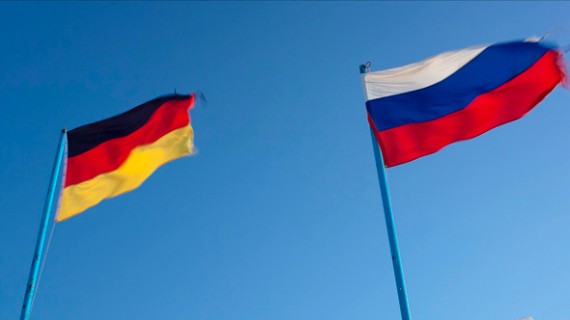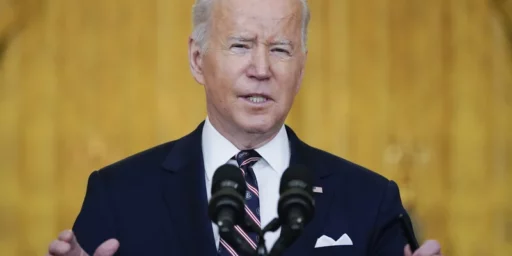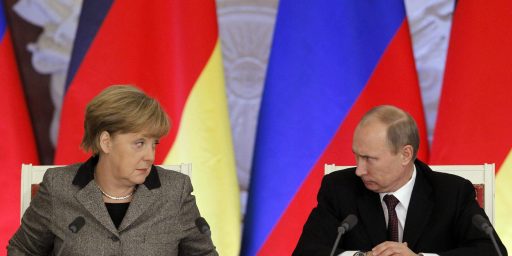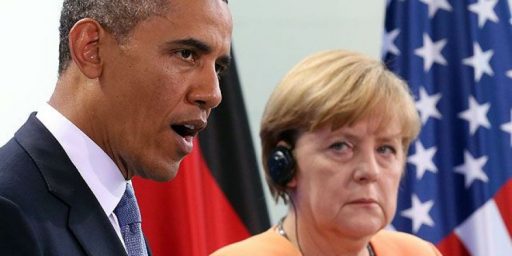German Public Backs Sanctions Against Russia Even If They Hurt Germany
A new poll finds that a majority of Germans support sanctions against Russia, even if those sanctions end up hurting the German economy.
A majority of Germans support sanctions against Russia for its adventurism in Ukraine even if it ends up hurting the German economy:
The number of Germans supporting European Union economic sanctions against Russia over the Ukraine crisis has risen in the last month and a large majority supports Chancellor Angela Merkel’s toughening stance, a poll on Friday found.
The Politbarometer poll for ZDF television found 58 percent back the EU sanctions even if they damage the German economy, up from 52 percent a month ago.
The poll also found that 76 percent backed the sharper tone of Merkel’s recent criticisms of President Vladimir Putin’s policies.
This poll comes just a few weeks after German Chancellor Angela Merkel’s harsh words for Russia, harsher than we have seen to date, in the wake of the G-20 Summit and the reports of renewed Russian incursions into eastern Ukraine. If nothing else, numbers like this suggest that Merkel would not be taking much of a political risk if she were to back tougher sanctions against Russia that could potentially harm the German economy, although the reality of that may turn out to be quite different if she goes forward with such a plan and Germans decide that the economic pain isn’t worth it. In addition to following the Merkel comments, though, these poll numbers also follow an appearance by Russian President Putin on German television in which he sought to appeal to the German people in a rather obvious attempt to make an end run around the government in Berlin. These numbers suggest that the Russian President miscalculated greatly, and that Germans are about as fed up with recent Russian adventurism as the rest of Europe is at this point and ready to see their government take a stronger stand against the efforts to undermine the government and territorial integrity of Ukraine and other threatening efforts that we’ve seen from Russia.
Walter Russell Mead makes another interesting, perhaps significant, observation:
This doesn’t just mean that Putin faces more trouble than he’d hoped as a result of his Ukrainian adventure. It means something more significant: that a united Germany is accepting Konrad Adenauer’s vision that Germany’s future lies with the Atlantic West, and not with the despotism to the East.
Many in the U.S. and other Western countries criticize various aspects of Germany’s political and economic stance, but it is worth remembering that on the central issue, the one that brought ruin and destruction to Europe twice in the twentieth century, Germany appears to be holding fast.
Obviously, things like Putin’s interview with German television, as well as other not too subtle hints about the damage that sanctions could have on Germany, are meant to undermine this idea, so I suppose it’s good to see that Russia’s efforts have not had the intended effect. At the same time, though, I have to wonder how much danger there ever really has been of Germany straying from the Atlantic West. It’s true, for example, that the ties between Germany and Eastern Europe/Russia have remained strong since West and East Germany were reunified more than twenty years ago, but it has always seemed as though the German’s recognized where their political and economic future lies even as they seek to take advantage of the economic opportunities to the east. It would be different, perhaps, if Putin were offering anything approaching a viable economic alternative, but he isn’t. Outside of energy, the Russian economy is fairly weak and likely to suffer now that worldwide energy prices are on a downward spiral. Internally, the economy remains dominated by government connected oligarchs and corruption to an extent that makes actually doing business there fairly difficult. More importantly, all of Germany’s neighbors to the east, with which it also does significant amounts of business, clearly recognize that their own futures lie to the west as well. Germany looking east when everyone else is looking west would be shortsighted, irrational, and, well, not very German when you get right down to it.
The important question, of course, is how likely it is that we’ll see a more aggressive policy toward Russia on the part of Germany when it comes to sanctions as we go forward. Words from the Chancellor and poll numbers are one thing, but as important as they might be in at least establishing support for the idea of tougher action from the Germany, it’s policy that matters. Putin is gambling on the idea that, in the end, the West won’t go full bore on the kind of economic sanctions that could actually hurt the Russian economy no matter what he does in Ukraine. Whether the West will call that bluff remains to be seen.







A barrel of oil is selling for $65 today, and OPEC has promised to keep the taps on. Germany is led by a woman raised and educated in the DDR who is fluent in Russian. This will not be an easy nut to crack for Mr. Putin. He will not gain any advantage by looking deeply into her eyes. Frau Merkel is a Protestant from eastern Germany as was my mother-in-law; my advice is to just give in.
Between the sanctions and falling oil prices, the rouble has taken an epic nose dive. Funny that we don’t seem to be hearing as many calls for strong, Putin-esque leadership in America from the right as we were just a short while ago.
I have maintained from the start of the Crimea thing that Putin was a blunderer. Seems he may also be a straight-up thief.
His poll numbers are strong, of course, because there are few peoples in the developed world more strongly addicted to self-destructive leadership than the Russians. But if the kleptocrat thing gets traction in Russia that, along with the tanking economy, the sanctions, the fact that the Russian taxpayer now has to support Eastern Ukraine, who knows,maybe the Russian people will sober up long enough to realize they’re being had.
Nah. They won’t. These are the idiots who still think Stalin was mostly a great leader.
And now they are worried about all their customers finding new suppliers.
http://www.nytimes.com/2014/12/01/world/russian-money-suspected-behind-fracking-protests.html
“Desperation is a stinky cologne”